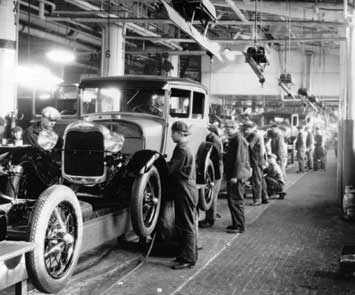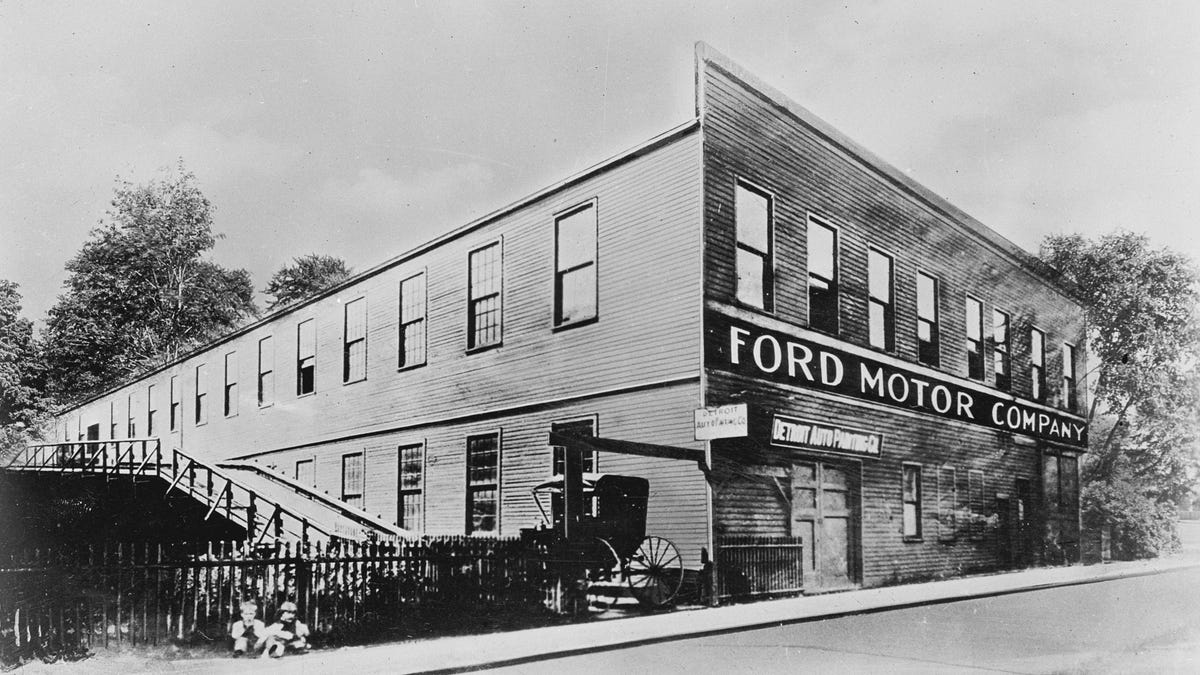


On May 1, 1926, Ford Motor Company becomes one of the first companies in America to adopt a five-day, 40-hour week for workers in its automotive factories. The policy would be extended to Ford’s office workers the following August.
Henry Ford’s Detroit-based automobile company had broken ground in its labor policies before. In early 1914, against a backdrop of widespread unemployment and increasing labor unrest, Ford announced that it would pay its male factory workers a minimum wage of $5 per eight-hour day, upped from a previous rate of $2.34 for nine hours (the policy was adopted for female workers in 1916). The news shocked many in the industry—at the time, $5 per day was nearly double what the average auto worker made—but turned out to be a stroke of brilliance, immediately boosting productivity along the assembly line and building a sense of company loyalty and pride among Ford’s workers.
The decision to reduce the workweek from six to five days had originally been made in 1922. According to an article published in The New York Times that March, Edsel Ford, Henry’s son and the company’s president, explained that “Every man needs more than one day a week for rest and recreation….The Ford Company always has sought to promote [an] ideal home life for its employees. We believe that in order to live properly every man should have more time to spend with his family.”
Henry Ford said of the decision: “It is high time to rid ourselves of the notion that leisure for workmen is either ‘lost time’ or a class privilege.” At Ford’s own admission, however, the five-day workweek was also instituted in order to increase productivity: Though workers’ time on the job had decreased, they were expected to expend more effort while they were there. Manufacturers all over the country, and the world, soon followed Ford’s lead, and the Monday-to-Friday workweek became standard practice.
It is my sincere desire to provide readers of this site with the best unbiased information available, and a forum where it can be discussed openly, as our Founders intended. But it is not easy nor inexpensive to do so, especially when those who wish to prevent us from making the truth known, attack us without mercy on all fronts on a daily basis. So each time you visit the site, I would ask that you consider the value that you receive and have received from The Burning Platform and the community of which you are a vital part. I can't do it all alone, and I need your help and support to keep it alive. Please consider contributing an amount commensurate to the value that you receive from this site and community, or even by becoming a sustaining supporter through periodic contributions. [Burning Platform LLC - PO Box 1520 Kulpsville, PA 19443] or Paypal
-----------------------------------------------------
To donate via Stripe, click here.
-----------------------------------------------------
Use promo code ILMF2, and save up to 66% on all MyPillow purchases. (The Burning Platform benefits when you use this promo code.)





To be fair (and I’m not completely able to judge his actual motivation), this was in a time before the Federal Reserve began rampant inflation, before the government started STEALING the majority of the wealth of the nation every year, etc. Businesses kept the vast majority of the money they made, as did nearly every individual, and the gold standard meant that the currency kept its value (actually increasing with productivity gains). With minimal inflation, interest rates set more by the market than by the criminal fed, etc. the productivity gains that hard working employees and creative business owners achieved, were available to be spent, saved, shared, etc. Henry Ford created low-cost automobiles to meet the market demand of his own employees, as much as he did to capture a even great share of the market. He indeed was a big supporter of the Nazis, but socialists in general are not known for their benevolence.
what this man needs ain’t for hf to decide. or give. or noblesse oblige. or ‘nat’ or ‘soc’ or …
& for those for whom it *is* (was) hf’s to give – they have no defensive arguments against what the ones w/o designated halos decide, or deign, or condescend, or collude to “give.”
but if hf was just authentically ramping up competitive pressure (joking), good man.